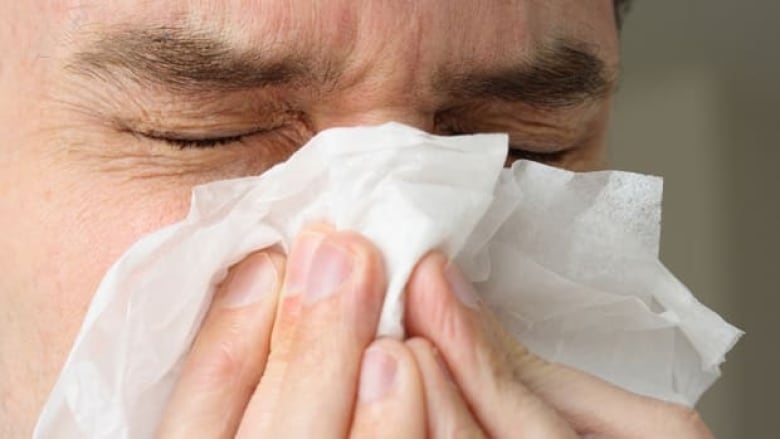Pollen explosion descends on Montreal, much to the discontent of allergy sufferers
The city is seeing its highest pollen levels in the past five years due to early spring, warm weather

It's been a ubiquitous sight the past few weeks, yellow dusting on just about everything outdoors.
Even if you aren't an allergy sufferer, you'd be hard-pressed to miss the pollen and this year, it's much worse than usual in Montreal.
"We're seeing a huge pollen explosion this spring," saidDaniel Coates, the director of the Aerobiology Research Laboratories, based in Ottawa.
"It's caused a lot of allergy sufferers to not have a wonderful 2021 spring, in a very chaotic and crazy time."
The centremonitors pollen levels across the country, using what's called a "rotation impaction sampler."Essentially, a rod rotates in the air, causing anything floating by to stick to it.
Banner year for pollen
Coates notes that 2017 was a banner year for pollen in Montreal but 2021 hasso far blown that out of the park.
By this time in 2017, the measurements were15,077 grains per cubic metre. This year? It's already reached 26,291 grains per cubic metre.
In layman's terms, last year at this time, Montreal had had five days of "very high"pollen levels.
So far this year, there have been 34 days like that already.
But why?
"We talk about climate change all the time but it's also something that can be related to pollen levels," says Rita Silva, an ecologist in Montreal.
"Trees starting producing pollen when the weather gets warmer. With climate change, wehave the winter being shorter and the springstarts earlier and warmer. Trees will have a longer period of producing pollen."
Coatessays the lack of rainy days also plays a role.

Researching pollen and its relationship with humans
On aUniversit du Qubec Montralrooftop,Silva stoops down to check on her pollen trap.
Theecologist is also a postdoctoral researcher and part of a team looking into urban pollen. They're in the middle ofgatheringdata on pollen distribution throughout the city:in parks, more populated areas and rooftops.
"We have 24 sites across the entire island where we set up traps to find out how the pollen varies across the island," Silva said.
Silva notes that cities are planting more and more treesandthat, inevitably, brings pollen.
"What happens to humans who share the city with them? Some of us, we don't like pollen. We are sensitizedto it and then we get allergies, she says.
"But for plants, it's just a way for them to reproduce."
The project has a public health aspect.
By looking at the relationship between people and pollen, the hope is to be able to forecast pollen levels in the various locations, asort of a warning system for allergy sufferers.

Allergy symptoms worse than ever
Not only are pollen counts high, but allergy symptoms seem to be worse than ever.
At least, that's what Dr. Christine McCusker, has noticed. Thepediatric allergist and immunologist at the Montreal Children's Hospital says symptoms are more severe.
"We've had admission to hospital with severe asthma in patients that we've never seen it before," she said.
It's too early to explain why, and it is likely not all tied to just high level of pollens.
McCusker notes there could even be a link with the global pandemic.
"It seems that taking the yearoff from our normal viruses and regulation of the way our bodies work has an effect that is more than just the normal social isolation," she said.
"[The pandemic] isaffecting how our bodies are responding to their normal pollens."
She advises though, that people suffering from more than moderate symptoms, go see a doctor.
"Antihistamines are only the first line and they really should be used in the mildest of cases," she said.
"As soon as people have more severe symptoms than just what can be managed with an antihistamine, you should be seen and treated. You should feel healthy and you should feel normal."












_(720p).jpg)


 OFFICIAL HD MUSIC VIDEO.jpg)
.jpg)



























































































